#gender performance
Text
Having a conversation with trans-identified women gives me the same feeling as talking to a brick wall. They all go the same, so I'll just summarize a discussion I've had on here a while ago.
Socks (they/he/xe): "Oh, I identify as non-binary because I never associated with femininity, and I never felt attached to womanhood" (i.e. she doesn't like to conform to gender roles)
me: "You know womanhood isn't a feeling, right? Nobody, including myself, feels like a woman."
Socks (they/he/xe): "If you say that you should probably question your gender identity. You are probably trans. Gender is a feeling. You should read this (outdated) study about how trans people's brains are actually the opposite sex!"
me: "That's neurosexism. Also, it has been debunked. Don't you have any other arguments?"
Socks (they/he/xe): "Kill yourself TERF!!! You're probably just a trans man in denial!! Stop being transphobic!!"
#radblr#radical feminism#radical feminists do interact#radical feminist safe#terfsafe#terfblr#transgender#gender critical#gender performance#gender stereotypes#nonbinary
377 notes
·
View notes
Text
#gender feels#gender thoughts#gender jokes#polls#gender is a performance#gender performance#lgbt+#enby stuff
1K notes
·
View notes
Note
What’s your view on toxic female friendships. I think it’s such a shame betrayal seems to be more common theme in female friendships. Men seem to have life long friends without any drama at all. Of course there are women out there with good life long friends but sadly it’s rare especially in this era we live in
xx
I think the underlying themes here are patriarchy and internalized misogyny. It can appear in blatant forms like women who sabotage each other for male attention, body/appearance/slut shame other women, or overly criticize other women's behavior and choices.
But I also believe there's a more covert patriarchal dynamic to women-women friendships vs. men-men friendships that's only recently become a prominent conversation in the public sphere/social media. As women, we're taught that it's our responsibility and culturally conditioned to perform all the emotional labor for the people in our lives – mainly men, but also other women. Men are taught and socialized with the opposite mentality.
So, I believe the dilemma comes down to this:
Female friendships exist as an outlet to unload our emotional stressors from all the men and women in our lives, so along with strict standards to be the "perfect" woman, it is easy for women to get on each other's nerves/bad side when we're all constantly emotionally exhausted and unloading onto each other. We overemphasize the emotional labor we should expect out of each other because we are conditioned to do this for the men in our lives. But, because other women aren't men, we start to resent/project onto them this anger. It's a very insidious type of internalized misogyny that I think a lot of women aren't aware of and therefore do not confront.
Then, there's the other side of the coin, where men don't really have these expectations of other men. Their friendship is based more on camaraderie through mutual interests, upbringing, lifestyles, or shared experiences (like working together, attending the same university, etc.). They don't uphold this expectation of performing emotional labor for themselves or each other. That role is reversed or the women in their lives.
Of course, I believe most men are so socially conditioned by patriarchy that they don't even realize this underlying dynamic and there are plenty of exceptions of emotionally intelligent men who desire to/actively unpack this to create more emotionally nourishing and equitable relationships in their lives, but I'm speaking in generalities for comprehension's sake.
Hope this resonates with some of you and answers your question. Bisous xx
#female friendship#male friendship#gender norms#gender roles#patriarchy#gender dynamics#women's empowerment#feminist#feminism#female socialization#male socialization#social norms#social commentary#gender performance#intersectional feminism#femmefatalevibe#q/a
128 notes
·
View notes
Photo

if you heard about drag show in your town BUY THE FUCKING TICKET it's SO COOL EXPIRIENCE I CAN'T DISCRIBE DRAG SHOWS IS FUCKING BEST, I CAN'T BELIVE I MISSED THIS KIND OF FUN ALL THESE YEARS
676 notes
·
View notes
Text
Gender is a performance and I don't have enough spoons to bother trying.
#genderqueer#nonbinary#queer#actually autistic#actually adhd#non-binary#gender performance#neurodivergent#this is framed as a joke#but I think it might also be factual
311 notes
·
View notes
Text

[Image description: A tumblr reply, edited blackout-poetry style to read, "Femininity is a costume."]
---
Femininity is a costume
442 notes
·
View notes
Text
analyzing taylor swift’s 'tim mcgraw' reveals a complex interplay of gender norms. let’s unpack the song through judith butler’s gender performativity theory.
butler’s theory says that gender isn’t inherent but performed, shaped by societal norms and expectations, challenging traditional notions of gender identity.
this song at first appears to conform to traditional gender roles. the opening of the song establishes a conventional male-female dynamic, reflecting societal expectations of femininity.
butler's theory suggests gender is an ongoing performance. in 'tim mcgraw,' swift’s portrayal of longing and nostalgia fits into this traditional feminine role, but she immediately subverts expectations by calling what “he” said a lie.

the subsequent shift in pronouns from 'he/him' and 'my' to 'you' in the song is more than just a narrative device. it’s a deliberate move that transitions the story from a personal memory to a universal, inclusive experience.

this use of 'you' invites listeners of all genders and orientations to place themselves within the narrative, challenging the binary and exclusive nature of traditional gender roles.
by broadening the song's appeal, swift subtly questions the rigidity of these roles. this aligns with butler’s concept of gender as fluid, shaped by societal interactions and individual experiences.
the dynamic interplay of gendered pronouns in ‘tim mcgraw' showcases swift’s nuanced understanding of gender performativity, blending traditional narratives with progressive concepts.
thus, swift's songwriting in 'tim mcgraw' serves as a subtle yet powerful commentary on gender norms, illustrating the evolving nature of identity in modern society.
this analysis highlights the depth of swift’s work, even at a young age, showing how popular music can be a platform for challenging and redefining societal constructs of gender and identity.
#judith butler#gender performance#gaylor analysis#gaylor#friends of dorothea#taylor swift#lgbetty#queer theory#sapphic
31 notes
·
View notes
Text
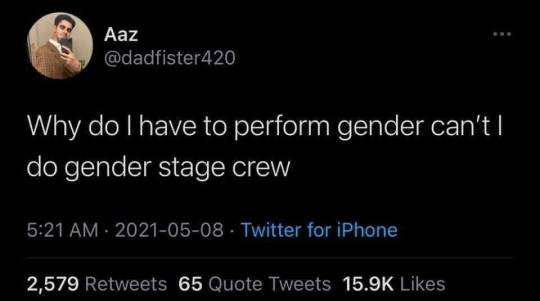
My friend said "In this case I think I’d be gender dramaturgy"
41 notes
·
View notes
Text
gender is a performance and i’m going for the Oscar babey
10 notes
·
View notes
Text
God's Own Country: A Happy Ending for Gay Film
In Yorkshire, northern England, 24-year-old Johnny Saxby lives with his father, Martin, and grandmother, Deirdre, and runs a family farm together. Johnny has to do endless farm work day in and day out, so in his free time, he often numbs himself with alcohol and sex. One day, a Romanian migrant worker, Gheorghe Ionescu, was hired by Martin to help with the busy lambing season. Johnny does not get along well with this quiet and handsome 27-year-old young man until one day he tackles Johnny to the ground and warns Johnny not to call him "gypsy" again. On the next day, they have a rough and passionate sex in the dirt and later gradually become closer. When Martin suffers a second stroke, Johnny realizes the responsibility of running the farm falls entirely on his shoulders. He asks Gheorghe if he can stay with him and maintain the farm together, but Gheorghe believes if they cannot redefine their relationship, this plan will not survive. Johnny then gets upset and drinks to excess and has a random sex with another man, which is found out later by Gheorghe, so Gheorghe leaves the farm with sorrow and anger. But in the end, Johnny brings Gheorghe back and Gheorghe moves into the house from the original caravan.
The above description is about the British film God's Own Country, written and directed by Francis Lee in 2017, which won the world cinema directing award at the 2017 Sundance Film Festival as the only UK-based production. This film is partly based on Lee's own experience, who is a gay people used to live in Yorkshire. As an uncommon gay film with a happy ending, God's Own Country expands queer media territory into the countryside and migrants. While God's Own Country presents a new perspective to view gay people, it also reinforces problematic narratives through its depiction of traditional masculinity, representation of migrant, and "normalization" of gay identity. With three main themes presented, this review post also discusses the connection between masculinity and gender performativity, migrant and intersectionality, and gay identity and homonormativity.

From the character setting, and storyline, to the environment, God's Own Country is permeated with a traditional and binary "masculinity". The protagonist, Johnny, is a young sheep farmer living in the Yorkshire countryside who often engages in binge drinking and furtive casual sex. When he finds the one he wants to stay with (Gheorghe), he messes up since he does not know how to deal with this romantic relationship. And when he tries to bring Gheorghe back, it seems very difficult for him to express his apology. The depiction of such character is easily connected to a kind of traditional "masculinity" that is unemotional, violent, strong, high self-esteem, etc. Or, to put it in another way, an aggressive young man lives in a wild farm who does now know how to start an emotional communication.
Judith Butler (2006) argues that "there is no gender identity behind the expressions of gender; that identity is performatively constituted by the very 'expressions' that are said to be its results" (p. 34). In other words, "our gender is our expressions and behaviours (rather than those expressions and behaviours being the result of some underlying gender identity)" (Barker & Scheele 2016, p.79). People's gender then is more like an expression that is believed to be appropriate and correct within their cultural environment rather than a fixed nature within their bodies. In this sense, the masculinity of Johnny is more like an "intelligible" way to perform within his condition - a young sheep farmer in the countryside. The "good" thing may be Johnny, as a gay man, is not depicted in a stigmatized or stereotypical way that happens in many shows, but its depiction seems to reinforce the binary understanding of gender.


youtube
God's Own Country was released in 2017, which coincides UK's attempt of withdrawing from the European Union. Gheorghe, as a Romanian migrant worker in the film echoes the issue of migrants in Britain. Both as gay men, the nation, race, and class of Gheorghe is quite different from that of Johnny. Such demographic factors are greatly influencing the way Gheorghe interacts with Johnny who is a white, work-class, native British. When they first met, Johnny called Gheorghe a "gypsy". Later when they are in the bar, a white racist there also deliberately teases Gheorghe because of his identity.
Intersectionality refers to the overlapping of social categorization and how it is linked to the interconnected oppression. Doty (1993) also argues that cultural factors such as "class, ethnicity, gender, occupation, education, and religious, national, and regional allegiances influence our identity construction" and "can exert influences difficult to separate from the development of our identities queers" (p. 5). Although Gheorghe's identity of being gay does not bring him too much direct discrimination in the film, his race and class affect how he interact with Johnny and other people (such as the white racist in the bar mentioned above). And Gheorghe's conflict with Johnny is raised due to his identity, i.e. how Gheorghe as a Romanian migrant worker has a romantic gay relationship with a white, British farmer.
Moreover, how the film represents Gheorghe and his relationship with Johnny is also problematic. "The formal axe around which the film functions is the act of looking and being looked at, in particular the suspicious staring of the foreign 'outsider' by the white 'insider'" (Williams 2020, p.77). That is to say, the presentation of a Romanian migrant is from the viewpoint of a white British man. Although Gheorghe as a migrant seems to be depicted as the "savior" of British white man Johnny, Gheorghe's intersectional identity is actually not fully represented but more portrayed as the support or supplement of the main white character. For example, it is Gheorghe who saves Johnny from the heavy workload and mental loneliness, and teaches him how to "love" someone instead of just having brutal sex.
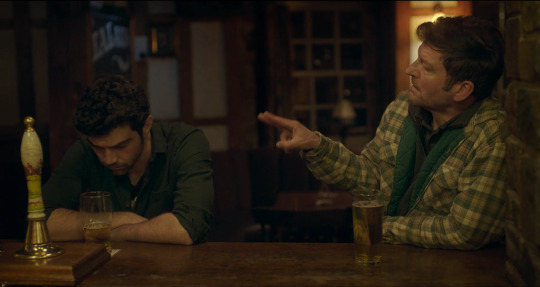
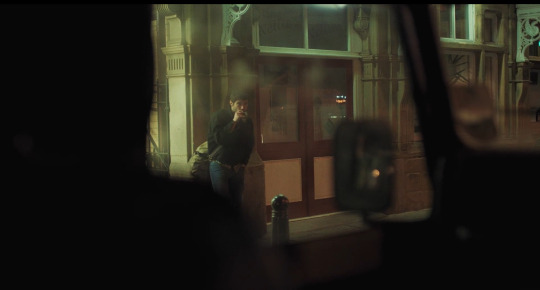
Unlike Brokeback Mountain (2005) or Boys Don't Cry (1999), queer characters do not struggle too much with their identity and social discrimination in God's Own Country. The gay identity of Johnny and Gheorghe seems to be very "natural" and "ordinary". Even when Deirdre, Johnny's Grandmother, finds a used condom in Johnny's room and realizes that her grandson may have sex with another man Gheorghe, she only emphasizes to Johnny that "he is only here to work". Johnny's family seems to accept their gay identity and relationship very well, or in another way, their gay identity and relationship are somehow "normalized" in the film. Furthermore, within their own relationship, Gheorghe is depicted as a gentle lover who is trying to tame his aggressive partner. And their relationship from the hostile beginning to the happy ending is very similar to traditional Hollywood romantic heterosexual films.
Homonormativity "is a politics that does not contest dominant heteronormative assumptions and institutions, but upholds and sustains them, while promising the possibility of a demobilized gay constituency and a privatized, depoliticized gay culture anchored in domesticity and consumption" (Duggan 2002, p. 50). In other words, although gay people may seem to be accepted and included in the mainstream or heteronormativity dominated system, they are actually framed and hidden under the heteronormativity and thus lose their identity. Although it may be good that the gay identity and relationship of Johnny and Gheorghe are treated as nothing special, the essence behind that may be the gay culture is depoliticized and thus loses its nature of being gay. Even gay couples may no longer be depicted as gay couples but heterosexual couples.

As an Asian, heterosexual college student, I may not be able to resonate with the film too much. Probably the scene where Gheorghe is discriminated against by a white racist can trigger some of the experiences around me. And although this film tells a story of a gay couple, the way this film puts their relationship yet is quite "familiar" to me, because of the last point I discussed above (homonormativity).
Originally, the explicit sex scene in this film makes me feel a little bit "awkward" and I feel like such scene is not very necessary. However, my knowledge in queer media studies makes me reconsider the role of sex in this film and I find that it is actually very "meaningful". Johnny used to be very aggressive in sex, but after the "tameness" of Gheorghe, Johnny gradually enjoys the touch and understands that there can be "love" (or emotion) in sex instead of just fulfilling the sexual needs. That is to say, the sex scene in this film actually sees the growth of a young man, the understanding of love, and the finding of oneself.

--- Miles
References
Barker, M. & Scheele, J. (2016). Section on Butler. In Queer a graphic history (pp. 73-83). Icon Books.
Butler, J. (2006). Identity, sex and the metaphysics of substance. In Gender trouble: Feminism and the subversion of identity (pp. 22-34). Routledge.
Doty, A. (1993). There's something queer here. In Making things perfectly queer (pp. 1-16). University of Minnesota Press.
Duggan, L. (2003). Equality, Inc. In The twilight of equality: Neoliberalism, cultural politics, and the attack on democracy (pp. 43-66). Beacon Press.
Williams J. (2020). Queering the cinematic field: Migrant love and rural beauty in God's Own Country (2017) and A Moment in the Reeds (2017). In Queering the migrant in contemporary European cinema (pp. 72-86). Routledge.
#QueerMedia#movie review#god's own country#gender performance#intersectionality#homonormativity#josh o'connor#alec secăreanu#Youtube
66 notes
·
View notes
Note
opinion on drag queens?
Not a fan of them. I don't care if you are doing it under the guise of "art": dressing up as an exaggerated female caricature and throwing around words like "cunt" is misogynistic. And if you still insist Drag is an art, at least acknowledge it's a misogynistic one. Why do people find Drag shows funny? Seriously, do you think men masquerading as women with huge boobs and skimpy dresses are making fun of misogynistic stereotypes, and actively exaggerating them to point out how ridiculous these stereotypes are? Or are they just making fun of women? Parody can be used as a tool of awareness and subversion, but this kind of humor is just one-dimensional and purposeless. These men also always feel entitled to use derogatory language toward women, as if putting on a wig makes them similar to us, and even elevates them to some sort of femininity guru. Ultimately, I just find Drag Queens to be a tasteless show of misogyny behind the disguise of self-expression.
#radblr#radical feminism#radical feminists do interact#radical feminist safe#gender performance#terfsafe#radical feminists do touch
60 notes
·
View notes
Text
Androgyny—or rather, the perception of androgyny—has long been of
interest to scholars of gender and music. Here again, Philip Auslander’s
commentary on glam rock provides a valuable reference point. In glam,
gender-based clichés allowed heterosexuality’s organizing terms of
reference—men and women, dominance and submission, desiring and
desired—to be toyed with, overplayed, and exhausted: “Bowie threw the
sexuality of rock into question, not only by performing a sexual identity
previously excluded from rock but also by performing that identity in such
a way that it was clearly revealed as a performance for which there was no
underlying referent” (Auslander 2006, 135; emphasis in original). Nevertheless, the sudden visibility of male androgyny did not necessarily create visible new roles or spaces for women, even if women did attend glam concerts
and contribute significantly to its fan cultures. Auslander observes that glam
rock “was almost completely dominated by men and took the performance
of masculinity as its terrain” (229). Discourse on androgynous masculinities must be able to interrogate which kinds of masculinity are being transgressed, which versions of femininity are made available for re-signification,
and which audience members are being interpellated when new musical
personae are produced.
from the conference paper of Timothy Laurie on the Gendered Aesthetics of K-pop
#k pop#k-pop aesthetics#gender performance#androgynism#androgyny#gender politics#glam rock#david bowie
7 notes
·
View notes
Text
Look I'm just saying that for some folks, gender is something innate. For some folks it's not. Both are valid.
You can be your gender without "performing" or "presenting" it. Sorry if you disagree. You can be your gender in any way you want - even without cultural signifiers, even without "performing" it.
Maybe I'm splitting hairs here; what I'm trying to say is this:
You don't have to do anything at all to "present" or "perform" as your gender.
you can sit naked on the couch eating chips, and still be presenting as whatever gender you want.
Gender is a social construct, sure, and at the same time, it is something very innate and deep inside me and a part of who I am to my core. You can't "turn off" my gender by saying "gender is a social construct".
I would still be my gender standing naked with no "social signifiers". I would still be performing my gender without those signifiers.
If you're so fuckin' concerned with what society thinks of gender you can't grasp this, get off my blog.
#gender#trans#transgender#feminism#intersectional feminism#trans masc#transmasc#trans man#nonbinary#genderqueer#agender#trans femme#transfemme#trans woman#gender presentation#gender performance
591 notes
·
View notes
Note
Hey there! Absolutely adore your blog. Anyways, wanted to ask how to heal myself enough to be comfortable around men? I realised I get very nervous around men and my body still doesn’t trust them recently. I thought I had made progress and was maybe open for relationships and stuff but being around a new guy automatically makes me flighty. I just don’t know how to overcome it
Hi love! Thank you so much <3
Honestly, there's probably a good reason (or a few) for you to have this unease around men, so validate that these uncomfortable emotions are coming from an informed place.
I believe the key here is to stop focusing on "men" as a monolith and focus on fine-tuning your misogyny radar. Be open to letting men show you who they are and take their words/actions seriously-–whether that be positive or negative in that specific circumstance.
Don't anticipate, evaluate.
Hope this helps xx
#dating advice#dating tips#dating and relationships#female sexuality#female power#social norms#patriarchy#gender dynamics#gender norms#gender performance#self love#glow up tips#higher self#self reflection#self worth#self awareness#femmefatalevibe#q/a
11 notes
·
View notes
Photo
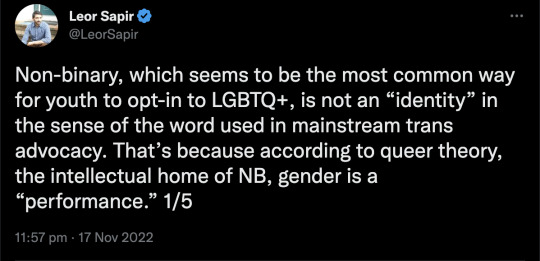

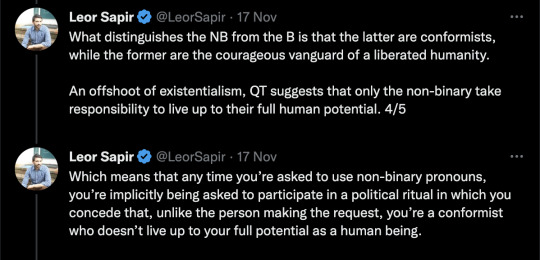

“Gender ought not to be construed as a stable identity or locus of agency from which various acts follow; rather, gender is an identity tenuously constituted in time, instituted in an exterior space through a stylized repetition of acts. The effect of gender is produced through the stylization of the body and, hence, must be understood as the mundane way in which bodily gestures, movements, and styles of various kinds constitute the illusion of an abiding gendered self. This formulation moves the conception of gender off the ground of a substantial model of identity to one that requires a conception of gender as a constituted social temporality. Significantly, if gender is instituted through acts which are internally discontinuous, then the appearance of substance is precisely that, a constructed identity, a performative accomplishment which the mundane social audience, including the actors themselves, come to believe and to perform in the mode of belief."
“If gender attributes, however, are not expressive but performative, then these attributes effectively constitute the identity they are said to express or reveal. The distinction between expression and performativeness is crucial. If gender attributes and acts, the various ways in which a body shows or produces its cultural signification, are performative, then there is no preexisting identity by which an act or attribute might be measured; there would be no true or false, real or distorted acts of gender, and the postulation of a true gender identity would be revealed as a regulatory fiction. That gender reality is created through sustained social performances means that the very notions of an essential sex and a true or abiding masculinity or femininity are also constituted as part of the strategy that conceals gender’s performative character and the performative possibilities for proliferating gender configurations outside the restricting frames of masculinist domination and compulsory heterosexuality.”
-- Judith Butler, “Gender Trouble: Feminism and the Subversion of Identity”
[As an aside, it’s no wonder Judith Butler was the winner of the Bad Writing Award in 1998. She’s an astonishingly terrible writer.]

Queer Theory itself tells us that “non-binary” is just a political performance. Basically the “cool” kids trying to make the squares feel square and want to join and conform with the cool kids, as they “complicate” and mess with society. Its entirely contrary nature is no more obvious than the fact it’s defined entirely by what it isn’t, rather than what it is. Being “non-conformist” in a predictable, socially acceptable, conformist kind of way. Hippy, grunge, emo, goth... every non-conformist conformed.
https://oxsci.org/anti-conformity-creates-a-new-conformity/
Despise anything that is “too mainstream”? Want to make a countercultural statement with an alternative style? Your one-of-a-kind look often ironically ends up pretty much the same as your counterculture peers. Intrigued by this counterintuitive phenomena, mathematician Jonathan Touboul at Brandeis University in Massachusetts breaks the problem down by studying how transmission of information through society influences people’s behaviour.
Time is needed for each individual to detect changes in society and react accordingly. While the propagation delay varies among individuals, it is crucial. Touboul’s research focuses primarily on a society with conformists copying the majority and anti-conformists rebelling against it. He then creates a computer model that stimulates how these agents interact. Start out acting randomly, anti-conformists then always undergo a phase transition into a synchronised state, with each other in opposing the mainstream. Depending on how the anti-conformists interact with the mainstream, the behaviour can become extremely complex. Nonetheless, it is an inevitable result of large populations to create some kind of conformity, even when you set out to go against the norm.
So much for teasing hipsters and e-girls, this research has more than mere meme value. Delays in the propagation of information play an important role in many other areas, such as understanding synchronisation of nerve cells, investment strategies in finance, or emergent dynamics in social science.

Bonus:
“Gender: The socially prescribed and enforced roles, behaviors, and expectations that are assigned to us at birth. These roles determine how you are ‘supposed’ to feel and act based on your body.”
-- Ozlem Sensoy and Robin DiAngelo, “Is Everyone Really Equal?”
Translation:

#Leor Sapir#nonbinary#non binary#gender ideology#queer theory#stereotypes#Judith Butler#Gender Trouble#feminism#social conformity#gender stereotypes#gender identity#gender performativity#gender performance#wokeness as religion#cult of woke#woke#wokeism#woke activism#religion is a mental illness
39 notes
·
View notes
Text
Gender is a performance and I am
s Rodeo Clown 🤠
#it's an elaborate costume to do my silly little bits#I've been saying this for years#gender is a performance#and i am a rodeo clown#gender things#gender performance#performative gender#non-binary#nonbinary#yeehaw#rodeo clown#pat's post
39 notes
·
View notes